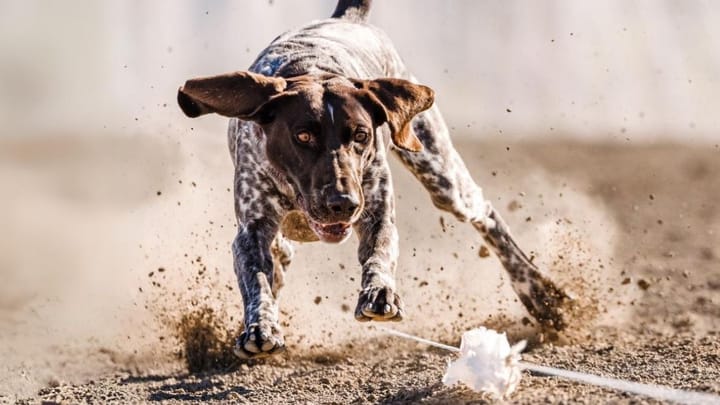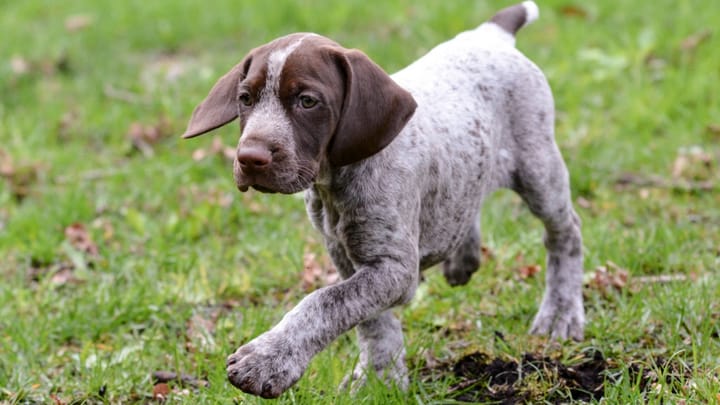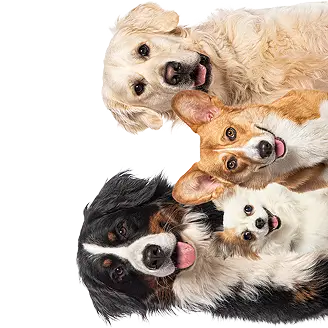German Shorthaired Pointer
Other names : Vorstehhund, Kurzhaar


The German Shorthaired Pointer is a breed that was first seen to accompany the German aristocrats of the 1800s on their hunting forays. It was originally (and in some parts of the world still is) an all-purpose gun dog capable of catching game as well as retrieving it. This breed of Pointer has webbed feet as a result of generations of selective breeding: a trait which was useful to the dog when recovering wild fowl from lakes and marshland.
|
Life expectancy |
The German Shorthaired Pointer has a life expectancy of between 12 and 14 years |
|
Temperament |
|
|
Size |
Large
|
|
Adult size |
Female
Between 23 and 25 in
Male
Between 24 and 26 in
|
|
Adult weight |
Female
Between 62 and 71 lb
Male
Between 62 and 71 lb
|
|
Coat colour
The most obvious physical attribute of the German Shorthaired Pointer is its coat. The coat can be solid liver colour or liver and white, and is often speckled through with small patches of black hairs or a mixture of colours including white. |
Black Brown |
|
Type of coat
The hair is short. Short and dense and rough to touch; the coat is thinnest across the head and ears. |
Short Hard |
|
Eye colour
Dark brown. |
Brown
|
|
Purchase price |
The German Shorthaired Pointer costs between £690 and £825 |
The German Shorthaired Pointer is the archetypal outdoor adventurer. It can swim well, does not tire easily, can fight off attacks from other animals and is exceptionally obedient. Training and socialisation are essential components of the early years’ development of this dog.
More details about the German Shorthaired Pointer
German Shorthaired Pointer: Origins and history
The descendant of the German Shorthaired Pointer is believed to be a German Bird Dog, itself descended from dogs of Spanish origin and brought to Germany in the 1600s. Other hounds and pointers are thought to have then been bred with the Bird Dog to bring about the German Shorthaired Pointer that we know today. The breed is unchanged since the 1800s and still retains the characteristic of an agile and versatile hunter.
Physical characteristics of the German Shorthaired Pointer
This dog is bred to move effortlessly and as such it has a streamlined body. From the withers at the top of the shoulders to the croup above the tail the back falls gently in an almost straight line. Its long ears are floppy and set high on its head. The dog’s muzzle has a Romanesque length to it and its jaw is broad and strong.
FCI classification of the German Shorthaired Pointer
-
Group 7 - Pointing Dogs
-
Section 1 : Continental Pointing Dogs
German Shorthaired Pointer: Characteristics
German Shorthaired Pointer: Behaviour
Training a German Shorthaired Pointer
The German Shorthaired Pointer is reasonably easy to train. However training must be done properly and consistently, and at all times the trainer must make an effort to hold the attention of the Pointer. If the attention is lost, the pupil is too. In order to ensure that what you are teaching a Pointer is learnt your training sessions should be short and done only when the dog is alert and responsive to you.
German Shorthaired Pointer: Lifestyle
Breed compatibility German Shorthaired Pointer
German Shorthaired Pointer: Purchase price
The price for a German Shorthaired Pointer dog varies according to their origins, age and gender. Therefore, for a dog registered at the Kennel Club, the price will be approximately £825.
Your average monthly budget to satisfy the German Shorthaired Pointer varies between £150 to £190.
German Shorthaired Pointer: Shedding
Average
Pointers shed a moderate amount. The hairs that come from its shedding are small and difficult to remove from fabric around the house. Seasonal and hormonal changes affect the rate at which the dog sheds: it will shed more vigorously as the weather improves towards the summer. This is not a good dog for allergy sufferers.
German Shorthaired Pointer: Grooming
The coat of the German Shorthaired Pointer is relatively easy to groom. Being short it requires a weekly brush with a firm bristle brush. The dog should only be bathed if it needs to be; after bathing dry the coat thoroughly. It is worthwhile to examine the ears of the Pointer on a regular basis to check for mites, fungal infections and a build-up of wax.
German Shorthaired Pointer: Health
12 to 14 years.
The German Shorthaired Pointer is an active and adventurous dog that likes nothing better than a day of outdoor exploration. It is tougher than many pointing breeds and can adequately repel attacks by other animals.
The short coat of the German Shorthaired Pointer allows it to be more tolerant of hot temperatures than most. Make sure there is plenty of fresh water on hand for this dog. Do not leave ANY dog in a car in the summer, even if you have parked in the shade.
The German Shorthaired Pointer is robust enough to withstand walks in the snow and rain, but care should be taken after cold walks to dry the dog’s coat.
Weight gain is not usually a feature of a well-exercised Pointer. But if your Pointer is not exercised as regularly as it should be and is fed too much human or substandard food it will quickly become obese.
- Lymphedema
- Hip dysplasia
- Entropion
- Gastric torsion
- Von Willebrand’s disease
Do you want a German Shorthaired Pointer dog ?
Oh no...
There are no German Shorthaired Pointer adoption profiles at the moment...




